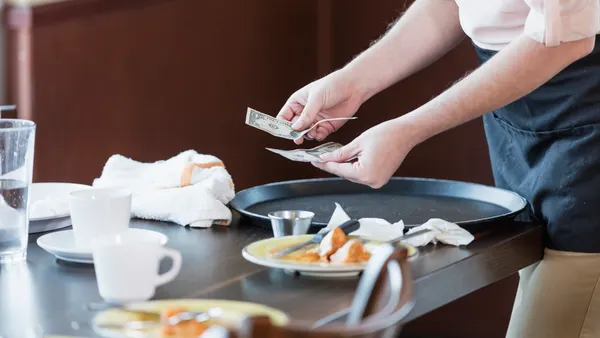Dive Brief:
- Starbucks is offering "catastrophe pay" to employees that are diagnosed with or exposed to COVID-19, according to a letter Starbucks President Rossann Williams wrote to employees on Wednesday. Full catastrophe pay covers 14 days, but Starbucks will make additional pay replacements of up to 26 weeks if employees are still unable to return to work. This benefit is temporary.
- The benefit will also be available to employees experiencing symptoms, even if they haven't come into contact with someone diagnosed with the virus, but only for scheduled shifts over a three-day period. After the three-day period, these employees can use sick pay, vacation or personal time off to cover their time off.
- Workers who are at elevated risk because of age or preexisting health conditions are eligible for the full 14-day catastrophe pay with a doctor's noted recommendation if they choose to self-isolate.
Dive Insight:
Starbucks' new coronavirus benefit follows McDonald's emergency paid sick leave offering, but the coverage goes a step beyond what the burger chain has rolled out, which impacts just 5% of its workers.
McDonald's is only extending 14 days of paid sick leave to workers who have been quarantined due to coronavirus and work at corporate-owned stores, compared to Starbucks' more flexible solution for different coronavirus-related concerns. Starbucks' catastrophe pay is also accessible to any hourly employee in its U.S. footprint. Both company benefits are temporary, however. Noodles & Company also launched an emergency sick leave policy at company-owned restaurants that will cover a maximum of 14 days of sick pay, according to an email obtained by Restaurant Dive.
It's possible that Starbucks' more generous approach to coronavirus-related sick leave will encourage other major chains to roll out similar offerings as the virus continues to spread. Only 25% of service workers get paid sick leave — in a 2015 study, more than 50% of food workers said they "always" or "frequently" work while sick — which poses a dangerous precedent regardless of the coronavirus. Chains like Chipotle have learned the hard way time after time that a lack of proper sick leave can have dire consequences.
After a norovirus outbreak, Chipotle began enforcing a new food safety culture in 2017, which includes regular wellness checks of staff, more aggressive sanitization of dining rooms and enforced paid sick leave. Since making these changes, the company has reported no food safety issues at its stores. Paid sick leave can help reduce risk of food contamination, which in turn better safeguards restaurant chains from costly foodborne illness outbreaks that can erode diner confidence and brand reputation.
The question is whether new paid sick policies encourage chains to make permanent sick benefits once the threat of the virus dies down. The tide may already be turning. This week Darden announced a permanent paid sick leave policy that it had developed before the coronavirus outbreak, but accelerated the rollout in response to current risk. The policy applies to all of its 180,000 hourly workers, granting workers 1 hour of paid sick leave for every 30 hours worked. It's too early to gauge whether or not this trend of emergency paid sick leave benefits will have lasting impact, but there's no doubt similar benefits will continue to crop up across segments as coronavirus impacts more of the U.S.












